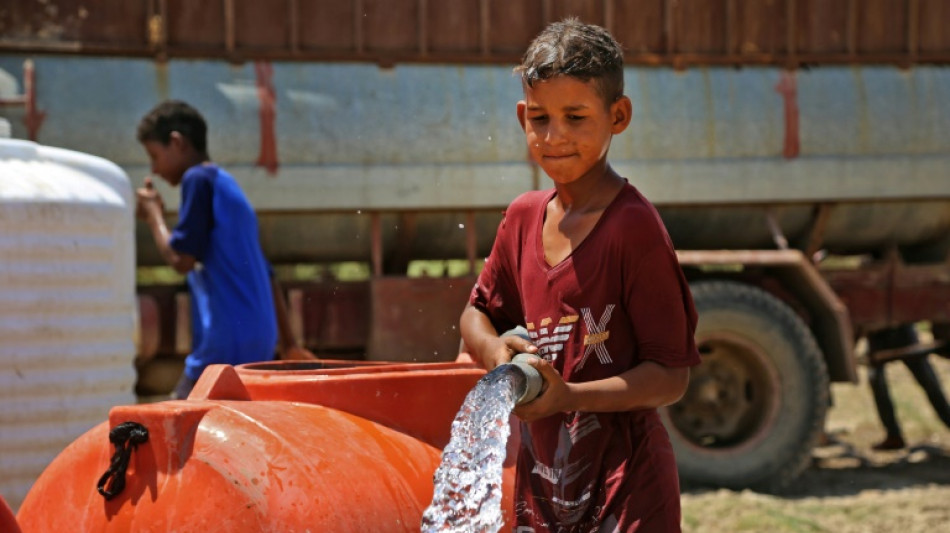
-
 McIlroy shares Riviera clubhouse lead as Rai charges, Scheffler fades
McIlroy shares Riviera clubhouse lead as Rai charges, Scheffler fades
-
Philippines' Duterte earned global infamy, praise at home

-
 Stocks drop, oil rises after Trump Iran threat
Stocks drop, oil rises after Trump Iran threat
-
As European heads roll from Epstein links, US fallout muted

-
 Families of Duterte's drug war victims eye Hague hearing hopefully
Families of Duterte's drug war victims eye Hague hearing hopefully
-
Russian decision is a betrayal: Ukrainian Paralympics chief

-
 Venezuela parliament unanimously approves amnesty law
Venezuela parliament unanimously approves amnesty law
-
Martinez missing as Inter limp to Lecce after Bodo/Glimt humbling

-
 India chases 'DeepSeek moment' with homegrown AI models
India chases 'DeepSeek moment' with homegrown AI models
-
World leaders to declare shared stance on AI at India summit

-
 'Everything was removed': Gambians share pain with FGM ban in balance
'Everything was removed': Gambians share pain with FGM ban in balance
-
Kim Jong Un opens rare party congress in North Korea

-
 Ex-Philippine leader Duterte faces pre-trial ICC hearing
Ex-Philippine leader Duterte faces pre-trial ICC hearing
-
Japanese star Sakamoto 'frustrated' at missing Olympic skating gold

-
 Japan inflation eases in welcome news for Takaichi
Japan inflation eases in welcome news for Takaichi
-
FIFA to lead $75m Palestinian soccer rebuilding fund

-
 Chicago Bears take key step in proposed Indiana stadium move
Chicago Bears take key step in proposed Indiana stadium move
-
Liu captures Olympic figure skating gold as US seal hockey glory

-
 North Korea opens key party congress
North Korea opens key party congress
-
Los Angeles sues Roblox over child exploitation claim

-
 Golden Liu puts US women back on top of Olympic women's figure skating
Golden Liu puts US women back on top of Olympic women's figure skating
-
Hodgkinson sets women's 800m world indoor record

-
 USA's Alysa Liu wins Olympic women's figure skating gold
USA's Alysa Liu wins Olympic women's figure skating gold
-
Man Utd cruise into Women's Champions League quarters

-
 Gu reaches Olympic halfpipe final after horror crash mars qualifiers
Gu reaches Olympic halfpipe final after horror crash mars qualifiers
-
Keller overtime strike gives USA Olympic women's ice hockey gold

-
 NASA delivers harsh assessment of botched Boeing Starliner test flight
NASA delivers harsh assessment of botched Boeing Starliner test flight
-
US Fed Governor Miran scales back call for rate cuts this year

-
 Gu qualifies for Olympic halfpipe final marred by horror crash
Gu qualifies for Olympic halfpipe final marred by horror crash
-
Trump issues Iran with ultimatum as US ramps up military presence

-
 Peru's brand-new president under fire for child sex comments
Peru's brand-new president under fire for child sex comments
-
UK police hold ex-prince Andrew for hours in unprecedented blow

-
 Former Olympic freeski halfpipe champion Sharpe crashes heavily
Former Olympic freeski halfpipe champion Sharpe crashes heavily
-
Former Olympic champion Sharpe suffers heavy halfpipe crash

-
 Belarus says US failed to issue visas for 'Board of Peace' meeting
Belarus says US failed to issue visas for 'Board of Peace' meeting
-
Forest boss Pereira makes perfect start with Fenerbahce rout in Europa play-offs

-
 Alcaraz fights back to book last four berth in Qatar
Alcaraz fights back to book last four berth in Qatar
-
England captain Itoje warns of 'corrosive' social media after abuse of Ireland's Edogbo

-
 War-weary Sudanese celebrate as Ramadan returns to Khartoum
War-weary Sudanese celebrate as Ramadan returns to Khartoum
-
Townsend expects recalled Scotland duo to shine in Six Nations clash with Wales

-
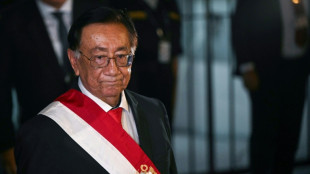 Peru's new president under fire for child sex comments
Peru's new president under fire for child sex comments
-
UK king opens London fashion week despite brother's arrest

-
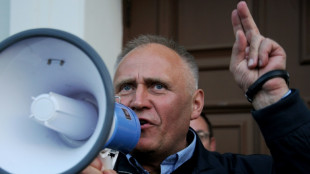 Belarus frees opposition politician Statkevich
Belarus frees opposition politician Statkevich
-
Striking Argentine workers slow down Buenos Aires in protest over labor reforms
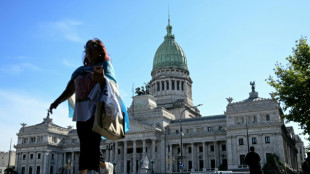
-
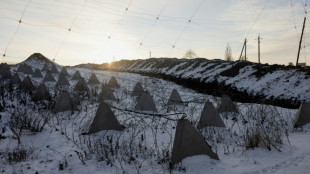 Starlink loss a blow to Russian forces in Ukraine: experts
Starlink loss a blow to Russian forces in Ukraine: experts
-
UN's Sudan probe finds 'hallmarks of genocide' in El-Fasher
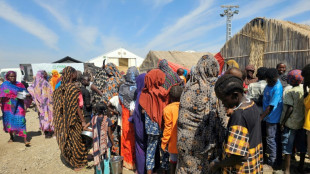
-
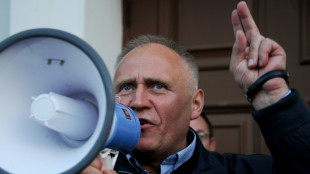 Belarus frees opposition politician Statkevich: wife
Belarus frees opposition politician Statkevich: wife
-
Rocket re-entry pollution measured in atmosphere for first time

-
 Airbus ready to build two new European fighters if countries want
Airbus ready to build two new European fighters if countries want
-
Canada makes push to attract skilled migrants, including for defence


Boiling heat and no water: taps run dry in southern Iraq
Younes Ajil turns on the tap in his home but nothing comes out: dozens of villages are without running water in drought-hit Iraq, surviving on sporadic tanker-truck deliveries and salty wells.
For everything from drinking to bathing and washing dishes and clothes, Ajil and his eight children wait at their home in Al-Aghawat for trucked-in water from the Diwaniyah provincial authorities once or twice a week.
In burning summer temperatures that at times approach 50 degrees Celsius (122 Fahrenheit), he said he hasn't bathed for four days.
"Even if there were daily deliveries, there would not be enough" water, the 42-year-old said.
Iraq is known in Arabic as the Land of the Two Rivers, but it has seen water levels on the once mighty Tigris and Euphrates plummet.
The Euphrates, which passes through Diwaniyah province, has visibly contracted in recent months, with some of the river's weaker branches drying up.
Governor Zouheir al-Shaalan said "around a third" of his province has problems accessing water, with more than 75 villages affected.
Ajil has dug a well, but the water is salty.
"We mix that with the water from the trucks and make do," he told AFP.
- Climate migration -
Local children cry out and run towards an orange water truck as it drives up the dirt road in their village.
One person fills a tall white tank, climbing on top of it to hold the truck's hose as water gushes out, while others wait to fill smaller tanks or even cooking pots.
Children splash gleefully in a rusting old fridge that has been laid on the ground as a cramped, makeshift tub.
The UN classifies Iraq as the world's fifth most vulnerable country to climate change.
Authorities blame drought for the current water shortages, but also dams built upstream on some rivers and tributaries in neighbouring Turkey and Iran.
Ajil shares his house with his brother, Mohammed.
Like most of their neighbours, they used to make a living from farming.
But over the past two years, the drought has brought local agriculture to its knees, so they have been selling their sheep to survive.
There are around 50 houses in the village, Ajil said, but only 10 families remain.
"The rest have left," he said. "If there is no water, there is no more life."
A report published this month by the International Organization for Migration in Iraq said that "climate migration is already a reality" in the country.
More than 3,300 families across 10 provinces in the country's centre and south were displaced due to "climate factors" as of March this year, the report said, blaming water scarcity, high salinity and poor water quality.
- 'Farming is our lives' -
Hassan Naim, who manages Diwaniyah's water resources, said around 20 treatment plants were at a standstill.
Before, "some rivers ran dry, but only for a matter of days", he said.
The present crisis has been going on for more than two months.
Naim acknowledged that authorities were distributing a "very low" amount of water compared to what was needed, but cautioned against using high-salinity well-water.
Diwaniyah Governor Shaalan said that to end the shortages, the province needed to receive double the current water flows of 85-90 cubic metres (3,000-3,200 cubic feet) per second along the Euphrates.
"Diwaniyah has no border crossings, oilfields, religious sanctuaries or tourism" to generate income, he said, urging authorities in Baghdad to exclude the province from the federal government's water rationing plan.
"Farming is our lives," he said.
Hundreds of angry Diwaniyah residents have twice taken to the streets to protest the situation.
Al-Aghawat resident Razzak Issa believes a deal with Turkey, the source of the Euphrates, is needed to increase water supplies.
"Yes, we can ration usage, but it's hot. How am I supposed to ration? I don't bathe? I don't wash my clothes? I don't bathe my children? It's impossible," he said.
He too mixes salty water from his well with the trucked-in water from the authorities.
"Where can we go?" he said. "Everywhere in Iraq is "torture".
G.Stevens--AMWN



